Dog diseases
You know your dog better than anyone, you can see that he is not the same as usual. But it is not always easy to spot a problem. Learn to detect the symptoms, causes, and how to treat them.

Symptoms and signs that should alert you
Common Signs A Dog Is Sick
Does your dog seem a little ‘off’ or just not like its usual self? If so you are bound to be wondering if your dog is sick. But how do you know for sure? Below, our Grants Pass vets share some common signs of dog illness.
Caring For Your Dog’s Health
You love your dog and if they seem a little ‘off’ you are bound to be concerned that they could be sick. If only we could ask our dogs how they are feeling and get a straight answer, but alas it is up to us as pet parents to read the signs and get our dogs the help they need whenever they are feeling ill. But how can you tell if your dog is sick?
Signs Your Dog Is Sick
Any time your dog is showing behaviors or symptoms that cause you concern, it’s time to head to the vet. When it comes to your beloved pet’s health it is always best to err on the side of caution, regardless of whether your dog is showing the symptoms listed below. Some of the most common signs of illness in dogs include:
Important Note:
What are the most common diseases?
Non-exhaustive list:

Canine ParvoViruses (CPV)
Canine Parvovirus (also known as parvo) is a highly contagious viral disease affecting dogs, especially puppies.
It leads to severe symptoms like vomiting, bloody diarrhea, lethargy, and dehydration.
CPV spreads through contact with infected feces or contaminated environments.
Parvo kills thousands of dogs every year in Morocco.
Prevention involves vaccination and maintaining hygiene. Treatment focuses on supportive care and early veterinary intervention.
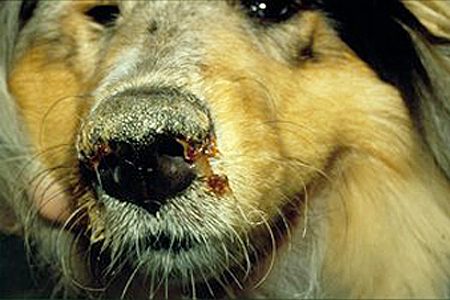
Canine Distemper Virus (CDV, causative agent of Carré’s disease)
Canine distemper, caused by the canine distemper virus, is a highly contagious disease affecting dogs globally.
Symptoms include fever, respiratory and gastrointestinal issues, neurological signs, and lethargy.
Vaccination is the primary prevention method, with puppies receiving a series of shots. Treatment focuses on managing symptoms, but there’s no specific antiviral medication.
Prevention through vaccination and hygiene practices is crucial due to the disease’s severity and high fatality rate, especially in puppies and unvaccinated dogs.
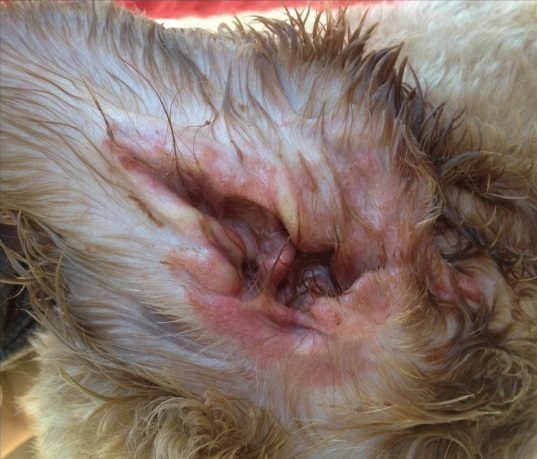
Ear Infections (Canine Otitis Externa)
Canine otitis externa is inflammation or infection of the outer ear canal in dogs. It causes symptoms like head shaking, ear scratching, redness, and discharge.
Diagnosis involves a vet exam and possibly ear cytology.
Treatment includes ear cleaning and topical or oral medications. Preventing recurrence involves proper ear care and addressing underlying issues.

Conjunctivitis
Conjunctivitis in dogs, or pink eye, is inflammation of the eye’s outer membrane. It can be caused by infections, allergies, or irritants. Symptoms include redness, discharge, and squinting. Diagnosis involves a vet exam. Treatment includes cleaning the eye and applying topical medications. Prevention includes good hygiene and prompt treatment of underlying issues.

Leishmaniasis
Leishmaniasis is a disease caused by a protozoan (single-celled) parasite found in dogs, cats, and certain rodents in many parts of the world, including Morocco, most commonly in rural areas.
Leishmaniasis is a disease caused by parasites transmitted by sandflies, affecting both humans and dogs.
In dogs, it leads to symptoms like skin lesions, weight loss, and organ failure.
Diagnosis involves blood tests, and treatment can be challenging. Prevention includes controlling sandfly populations and vaccinating dogs in affected areas.
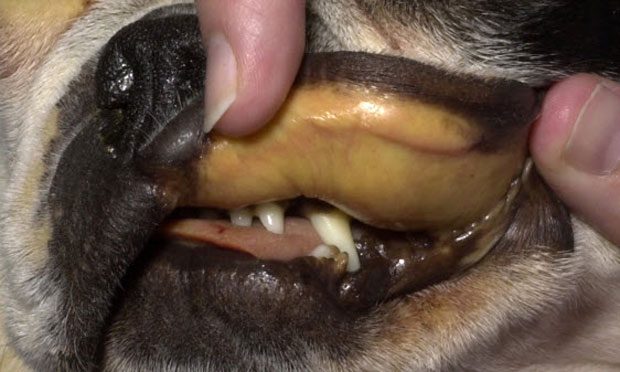
Canine Leptospirosis
Canine leptospirosis is a bacterial infection transmitted through contaminated water or urine.
Dogs can contract the disease through contact with contaminated water, soil, or urine from infected animals, including rodents.
Symptoms include fever, vomiting, and kidney or liver damage.
Diagnosis involves tests and treatment typically includes antibiotics. Prevention through vaccination and avoiding contaminated areas is key. Leptospirosis is zoonotic, so precautions are essential for both dogs and humans.
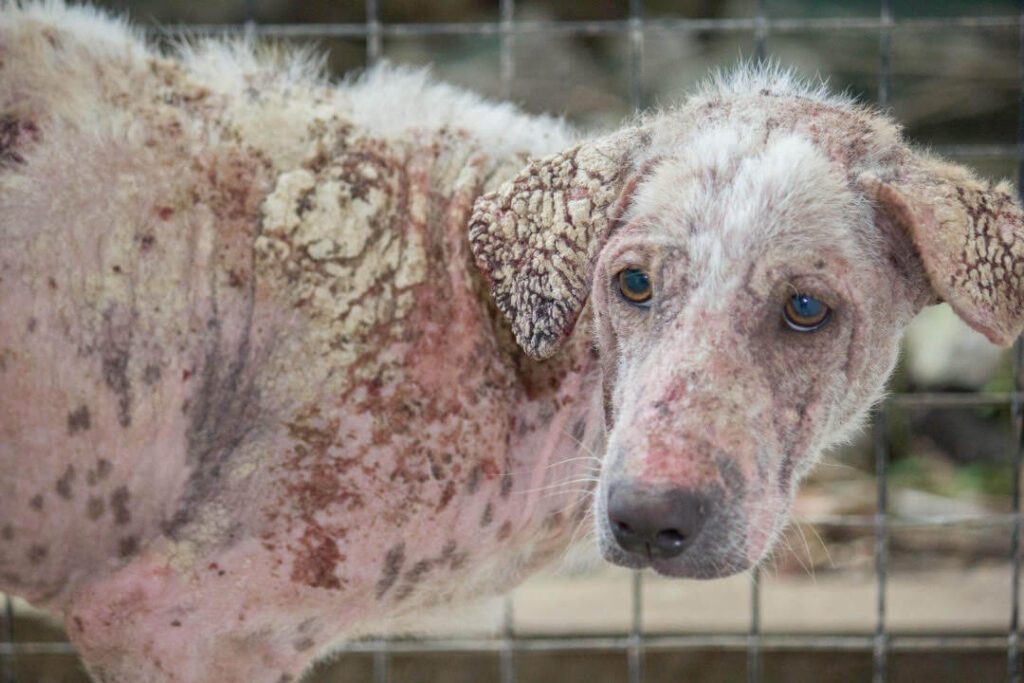
Mange Disease
Mange in dogs is caused by microscopic mites infesting the skin and hair follicles. There are two main types: sarcoptic mange, which causes intense itching and can spread to humans, and demodectic mange, typically affecting young or immunocompromised dogs.
Diagnosis involves skin scraping, and treatment includes medications to kill the mites and manage symptoms.
Prevention involves good hygiene and avoiding contact with infected animals.

Canine Para Influenza virus (CPIV or kennel cough)
Kennel cough, also known as parainfluenza, is a contagious respiratory infection in dogs caused by viruses like the canine parainfluenza virus and bacteria such as Bordetella bronchiseptica. It spreads easily in places where dogs gather, such as kennels or dog parks.
Dogs with kennel cough typically have a dry, persistent cough often accompanied by gagging or retching. They may also show signs of mild lethargy and have nasal discharge.
Diagnosing kennel cough involves assessing symptoms and considering recent exposure to other dogs. While most cases resolve with rest and supportive care, antibiotics may be necessary if there’s a bacterial infection. It can be prevented by vaccination.

Parvovirus
Canine parvovirus (CPV) is a highly contagious infection that affects dogs, especially puppies. It causes severe symptoms like vomiting, bloody diarrhea, and dehydration.
CPV spreads through contact with infected feces or environments. Treatment focuses on supportive care, including fluids and medications. Prevention through vaccination and hygiene practices is crucial for controlling the spread of the virus.

Pulmonary edema
Pulmonary edema in dogs is fluid buildup in the lungs, causing breathing difficulties. It can stem from various issues like heart or lung disease, infections, or toxins.
Symptoms include coughing, labored breathing, and lethargy.
Diagnosis involves exams and tests like X-rays.
Treatment targets the cause and may include oxygen therapy and medications. Prompt veterinary care is crucial for managing this serious condition.
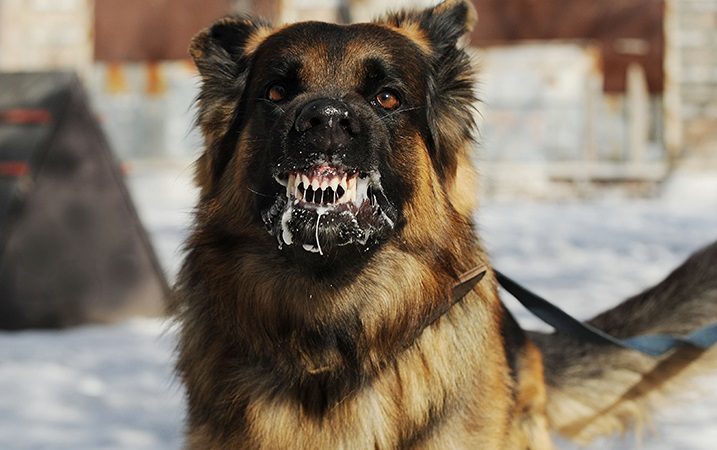
Rabies
Rabies is a deadly viral disease that affects mammals, including dogs, and is transmitted through the saliva of infected animals, usually via a bite. It affects the central nervous system, causing aggression or paralysis. Rabies is fatal once symptoms appear.
In Morocco, where it remains endemic, stray dogs are particularly at risk of contracting and spreading rabies due to their frequent contact with wildlife and other potentially infected animals.
Despite dog owners must vaccinate their pets, the lack of widespread national vaccination campaigns and veterinary care contributes to the spread.
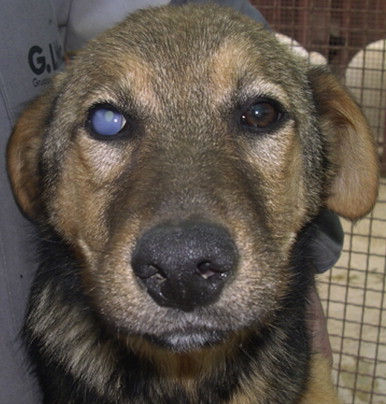
Rubarth’s hepatitis or Infectious Canine Hepatitis (ICH)
Infectious Canine Hepatitis (ICH), or Rubarth’s Disease, is caused by canine adenovirus type 1 (CAV-1) and primarily affects a dog’s liver, kidneys, and endothelial cells. It spreads through bodily fluids and presents with symptoms like fever, lethargy, vomiting, and jaundice. Treatment involves supportive care, including fluids and medications. Prevention includes vaccination and good hygiene practices. Early detection and treatment are crucial for better outcomes.
Prevention of ICH involves vaccination against CAV-1 as part of the routine vaccination protocol for dogs.
| Cookie | Duration | Description |
|---|---|---|
| cookielawinfo-checkbox-analytics | 11 months | This cookie is set by GDPR Cookie Consent plugin. The cookie is used to store the user consent for the cookies in the category "Analytics". |
| cookielawinfo-checkbox-functional | 11 months | The cookie is set by GDPR cookie consent to record the user consent for the cookies in the category "Functional". |
| cookielawinfo-checkbox-necessary | 11 months | This cookie is set by GDPR Cookie Consent plugin. The cookies is used to store the user consent for the cookies in the category "Necessary". |
| cookielawinfo-checkbox-others | 11 months | This cookie is set by GDPR Cookie Consent plugin. The cookie is used to store the user consent for the cookies in the category "Other. |
| cookielawinfo-checkbox-performance | 11 months | This cookie is set by GDPR Cookie Consent plugin. The cookie is used to store the user consent for the cookies in the category "Performance". |
| viewed_cookie_policy | 11 months | The cookie is set by the GDPR Cookie Consent plugin and is used to store whether or not user has consented to the use of cookies. It does not store any personal data. |
Create an account or sign in to save pets you love.
Don't have an account? Contact us
Before you proceed with your adoption application, please review and accept our data handling practices:
Note: By clicking "I Agree & Continue", you will be redirected to an external application form. This tracking system logs your interest but does not capture data from the external form.
Create an account or sign in to save pets you love.
Don't have an account? Contact us
Before you proceed with your adoption application, please review and accept our data handling practices:
Note: By clicking "I Agree & Continue", you will be redirected to an external application form. This tracking system logs your interest but does not capture data from the external form.